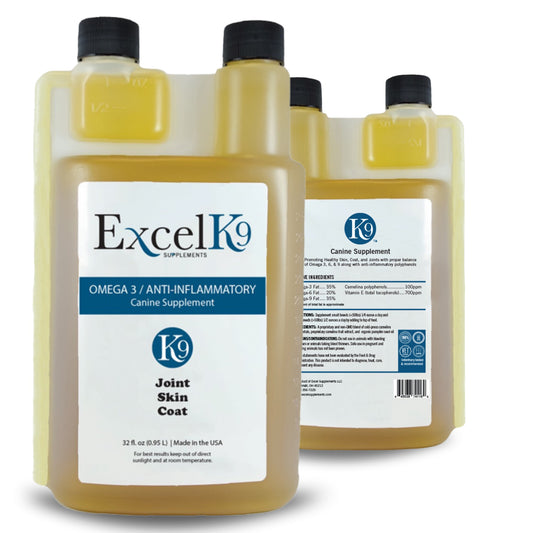Plant Based Omegas vs. Fish Oil: Which is better?
Share
In today’s world, many people treat their dogs and horses like family members, prioritizing their cleanliness, happiness, safety, and overall health. As devoted pet owners, we often look to supplements to enhance our animals’ well-being, including their mental sharpness, coat health, and joint mobility. One popular supplement is fish oil, but have you ever wondered if plant-based omegas might be a superior choice? Plant Based Omegas vs. Fish Oil: Which is better...
Understanding Omega-3 Fatty Acids
Types of Omega-3 Fatty Acids
Omega-3 fatty acids come in three primary forms: ALA (Alpha-Linolenic Acid), DHA (Docosahexaenoic Acid), and EPA (Eicosapentaenoic Acid). All these are long-chain fatty acids, essential for optimal health.
- Fish Oil: Provides potent DHA and EPA but lacks ALA.
- Plant-Based Sources: Rich in ALA, which the body can convert into DHA and EPA.
For a deeper dive into the differences between ALA, DHA, and EPA, check out our detailed blogs on canine health and equine health.
Benefits of Plant Based Omegas vs Fish Oil
Enhanced Health Benefits
Supplementing with plant-based omega-3s offers numerous benefits for both animals and humans. These benefits include:
- Coat Health: Promotes a shinier, healthier coat.
- Joint Health: Supports joint function and mobility.
- Cognitive Function: Enhances mental sharpness and cognitive abilities.
Additionally, plant-based omega-3s provide a balanced omega-3 to omega-6 ratio, which is crucial for maintaining proper inflammation levels. Unlike fish oil, which is omega-3 heavy, plant-based oils offer a more balanced approach to omega fatty acids.
Importance of Omega Balance
Optimal Omega Ratios
Maintaining a balanced omega ratio in your pet’s diet is crucial. An imbalance, with excessive omega-6 and insufficient omega-3, can lead to inflammatory issues. Since most commercial pet foods are high in omega-6, supplementing with omega-3 helps restore balance and supports healthy metabolic processes.
Environmental Impact
Plant-based omega-3s are also more environmentally friendly compared to fish oil. Overfishing is a significant concern, with one-third of the world’s fisheries exceeding sustainable limits. For more information on sustainability, click here.
Shelf Life Comparison
Longevity of Plant-Based Oils
Plant-based omega-3s, such as Excel's Camelina oil, have a longer shelf life than fish oil. Fish oil can become rancid within three months under optimal storage conditions, or even in just 30 days if improperly stored. In contrast, Camelina oil can last up to two years, making it a more durable choice.
Side Effects: Plant Based Omegas vs. Fish Oil
Plant-Based Omega-3 Side Effects
Plant-based omega-3 supplements have minimal side effects, which are generally mild and include:
- Diarrhea (mitigated by gradually introducing the supplement)
- Bad breath
- Poor-smelling sweat
- Unpleasant taste
Fish Oil Side Effects
Fish oil also shares similar side effects but with added concerns. Contaminants, which can include toxins from environmental pollution,can be found in the fish's fat therefore making its way into fish oil supplements. These toxins can negatively impact the immune, nervous, and endocrine systems.
Camelina Oil: The Superior Plant-Based Choice
Benefits of Camelina Oil
Among plant-based oils, Camelina oil stands out due to its high omega-3 content and balanced omega-3 to omega-6 ratio. Unlike flaxseed oil, which can go rancid quickly and has an imbalanced omega ratio, Camelina oil provides a stable and effective source of omega-3 fatty acids, enhancing overall health benefits.
Why Choose Excel Supplements?
Excellence in Production
Excel Supplements offers premium plant-based oil derived from Camelina, catering to the needs of equine, canine, and livestock diets. Our production process is fully in-house, ensuring traceability from our farmers to your pets. This commitment guarantees both quality and environmental sustainability.
Balanced Omega Ratios

We pride ourselves on providing oils with one of the most balanced omega ratios available, featuring a 2:1 ratio of omega-3 to omega-6. This balance ensures optimal nutrient absorption and overall health benefits for your pets.
In conclusion, when considering the benefits of Plant Based Omega vs Fish Oil, it’s clear that plant-based omegas offer a sustainable, nutritious alternative for supporting your pet's overall health. With their superior omega-3 to omega-6 ratio, plant-based oils like Camelina oil promote healthier joints, a shinier coat, and enhanced cognitive function, all while being gentle on the environment. While fish oil has its own merits, the long shelf life and balanced nutritional profile of plant-based omega sources make them a top choice for pet owners seeking optimal health for their furry companions.
For updated information on equine care, trending topics and discount opportunities follow us on social!
Follow us on Instagram: @excelsupplements
Keep up to date with us on Facebook: Excel Supplements




